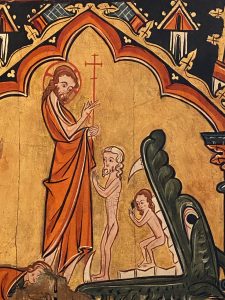Words on the Word
Easter Vigil 2025
In the beginning the earth was a formless void, there was darkness over the deep, and God’s Spirit hovered over the water. God said, Let there be light! And there was light.
Life presupposes light. Creation began with coruscation. The Bible tells us this; science confirms it.
Our Vigil, too, begins with a flame. Before a word is spoke, the Easter fire burns, a homily in itself, not least when it spreads from taper to taper within our church. A dark space starts to sparkle comfortingly. Joy flashes through our senses and minds: the power of darkness is dispelled! The world, and our presence in it, has meaning and finality. That inspires hope.
We know where and when Christ rose from the dead. His resurrection counts among Antiquity’s best documented events. Easter, however, is about more than an historical triumph. What we rejoice in is not the time-bound return from death of Lazarus.
Christ is not overwhelmed by death. He enters death as a battle, confronts it as a foe. Art shows him descending into the netherworld armed with the cross as weapon, constraining death, depicted as a greedy Leviathan like Jonah’s whale, to set its captives free. Adam and Eve emerge as the ambassadors of all their children. They stand there simultaneously ancient and fresh: a new humanity.
Such images may seem to us naive. That is how it must be. Face to face with eternal truth, our transient forms of expression are reduced to stuttering. The truth imperfectly represented, of Christ’s victory over death, carries, however; it constitutes the criterion by which to evaluate other truth claims.
God made all there is by his Word. Man was formed to resemble the Word and to be illumined by it. We opted for darkness. God did not abandon us. The Word became flesh to re-ignite his light in us. The Word entered the mute silence of death in order to resound there and to let his essential fire burn so that Christ’s faithful, when their hour comes, may go forth to encounter physical death in peace, with hope, recognising in it, as St Francis sang, a sister that does not close, but opens.
When the priest blessed the Easter fire, he prays:
O God, who through your Son bestowed upon the faithful the fire of your glory, sanctify ✣ this new fire, we pray, and grant that, by these paschal celebrations, we may be so inflamed with heavenly desires, that with minds made pure we may attain festivities of unending splendour.
We perceive the glory in flashes. We experience the desires intensely, in both body and soul. The most holy night of Easter confirms our intuition: it is possible even now to conduct a heavenly existence provided we live in Christ, the Living One, who is Resurrection and Life. The fire of glory that eludes us in the chaos that often constitutes life can become a mighty blaze if we let the Spirit of Christ breathe upon it and constantly add new fuel by living a Christlike life.
Through baptism, which the Fathers called φωτισμός, ‘illumination’, we have been granted a share in Christ’s consoling victory over sin and death. By his holy and glorious wounds we are guarded and protected. Night no longer has a claim to us. We belong to the day. Let us live accordingly, bearing our light graciously, singing Alleluia with conviction.
In the name of Christ! Amen

From a Spanish 13th-century ensemble, designed as panels of a tabernacle. Now in the MET Cloisters in New York.
